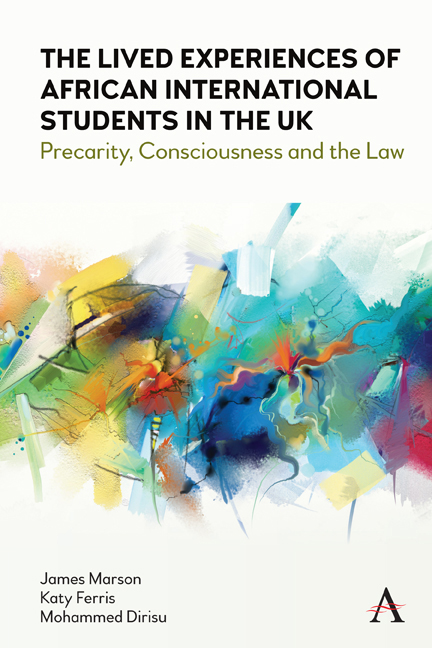 The Lived Experiences of African International Students in the UK
The Lived Experiences of African International Students in the UK Book contents
- Frontmatter
- Contents
- Preface
- Acknowledgements
- Legislation
- Case Law
- 1 Introduction
- 2 Methodology
- 3 Student Migration and Global Inequality
- 4 Migration as a Socio-Legal Phenomenon
- 5 The ‘Student-Migrant-Worker’ Meets ‘Precarity’
- 6 The ‘Utterly Transactional Worker’
- 7 Semi-Legal Working?
- 8 Conclusions
- Bibliography
- Index
6 - The ‘Utterly Transactional Worker’
Published online by Cambridge University Press: 13 September 2022
- Frontmatter
- Contents
- Preface
- Acknowledgements
- Legislation
- Case Law
- 1 Introduction
- 2 Methodology
- 3 Student Migration and Global Inequality
- 4 Migration as a Socio-Legal Phenomenon
- 5 The ‘Student-Migrant-Worker’ Meets ‘Precarity’
- 6 The ‘Utterly Transactional Worker’
- 7 Semi-Legal Working?
- 8 Conclusions
- Bibliography
- Index
Summary
Introduction
There are two different types of overseas students, if you look closely … you have the ones that look like … like they come from money, you know, come to class with all them expensive designers… And you find that most likely don't even have NI numbers, never applied, haven't done a minute of work since coming here because they don't need to… then there's us, that's the first thing we did … But we all pay the same school fees. (Abeo)
In this chapter we present a detailed account of the lived employment experiences encountered by a cohort of international student-migrantworkers. In so doing we provide a discussion of the findings gathered from interviews with (predominantly) postgraduate international students of sub-Saharan African descent, all aged between 25 and 35 years. This chapter is presented in four parts. For the first, we focus on the precursors of the employment experiences of the participants, including their expectations and reasons for seeking temporary employment. This segues into a discussion of the employment profile of these student-migrant-workers, including the roles they occupy, in which sectors, the pay levels received, and their work and sundry factors which underpin these. In the second part, we dive deeper into the students’ relationship with the atypical employment market, particularly TAW which is the prevalent employment form encountered. Here, we also consider the allure and negativities associated with temporary working for these student-workers. The third part of the chapter allows us to examine features which cause some of the students to maintain negative feelings towards work, including discrimination, exploitation and abuse they have faced. The final aspect of the chapter allows us to present a critical discussion of these findings through the frame of ‘precarity’. Here we examine the various mediums of insecurity and disadvantage the student-workers are prone to encounter. This is followed by a discussion of their opinions of their employment situation and commentary on how this experience might be bettered. We conclude with a summary and discussion of the key findings.
- Type
- Chapter
- Information
- The Lived Experiences of African International Students in the UKPrecarity, Consciousness and the Law, pp. 123 - 166Publisher: Anthem PressPrint publication year: 2022


